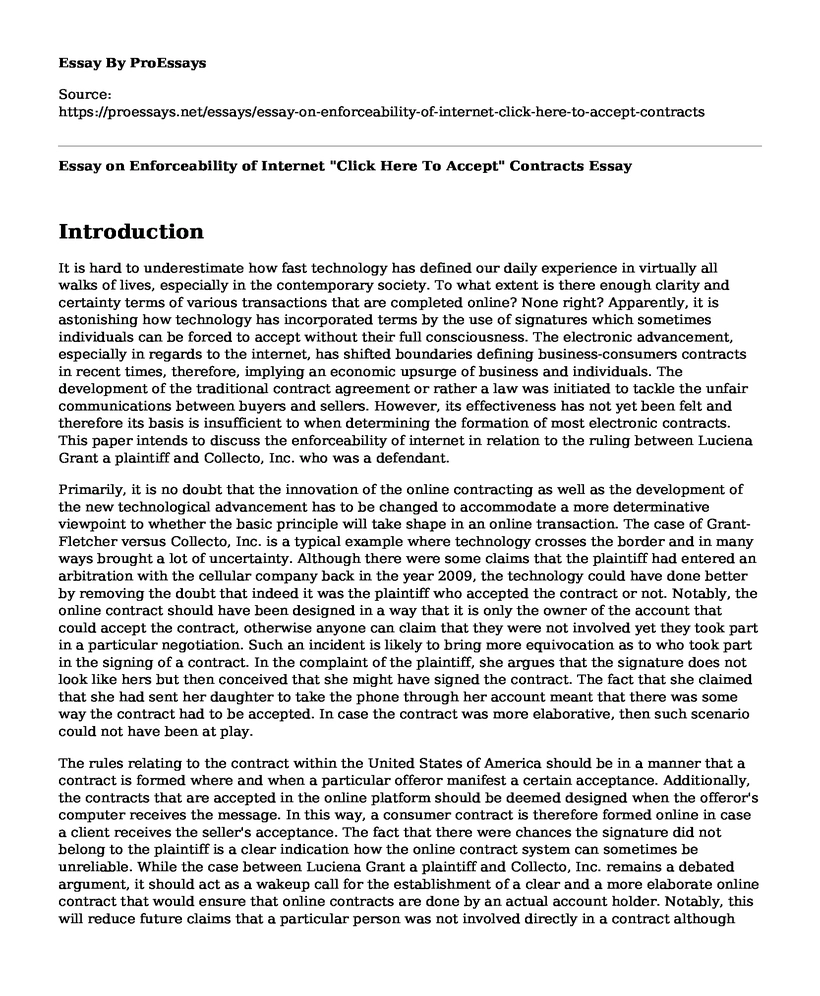Introduction
It is hard to underestimate how fast technology has defined our daily experience in virtually all walks of lives, especially in the contemporary society. To what extent is there enough clarity and certainty terms of various transactions that are completed online? None right? Apparently, it is astonishing how technology has incorporated terms by the use of signatures which sometimes individuals can be forced to accept without their full consciousness. The electronic advancement, especially in regards to the internet, has shifted boundaries defining business-consumers contracts in recent times, therefore, implying an economic upsurge of business and individuals. The development of the traditional contract agreement or rather a law was initiated to tackle the unfair communications between buyers and sellers. However, its effectiveness has not yet been felt and therefore its basis is insufficient to when determining the formation of most electronic contracts. This paper intends to discuss the enforceability of internet in relation to the ruling between Luciena Grant a plaintiff and Collecto, Inc. who was a defendant.
Primarily, it is no doubt that the innovation of the online contracting as well as the development of the new technological advancement has to be changed to accommodate a more determinative viewpoint to whether the basic principle will take shape in an online transaction. The case of Grant-Fletcher versus Collecto, Inc. is a typical example where technology crosses the border and in many ways brought a lot of uncertainty. Although there were some claims that the plaintiff had entered an arbitration with the cellular company back in the year 2009, the technology could have done better by removing the doubt that indeed it was the plaintiff who accepted the contract or not. Notably, the online contract should have been designed in a way that it is only the owner of the account that could accept the contract, otherwise anyone can claim that they were not involved yet they took part in a particular negotiation. Such an incident is likely to bring more equivocation as to who took part in the signing of a contract. In the complaint of the plaintiff, she argues that the signature does not look like hers but then conceived that she might have signed the contract. The fact that she claimed that she had sent her daughter to take the phone through her account meant that there was some way the contract had to be accepted. In case the contract was more elaborative, then such scenario could not have been at play.
The rules relating to the contract within the United States of America should be in a manner that a contract is formed where and when a particular offeror manifest a certain acceptance. Additionally, the contracts that are accepted in the online platform should be deemed designed when the offeror's computer receives the message. In this way, a consumer contract is therefore formed online in case a client receives the seller's acceptance. The fact that there were chances the signature did not belong to the plaintiff is a clear indication how the online contract system can sometimes be unreliable. While the case between Luciena Grant a plaintiff and Collecto, Inc. remains a debated argument, it should act as a wakeup call for the establishment of a clear and a more elaborate online contract that would ensure that online contracts are done by an actual account holder. Notably, this will reduce future claims that a particular person was not involved directly in a contract although the account belongs to them.
While the plaintiff's motion for reconsideration was denied and uncertainty continues to gloom, there is no doubt that the judge was based on the fact that the plaintiff had no strong evidence to the case. As technology takes the center stage in places such as courtrooms, there is a need of bringing any contract to the knowledge of an offeree. In other words, the offer, in this case, the defendant should have communicated to the plaintiff concerning the contract even before they came to a closure of such a blatant agreement. Therefore, in this case, there would be no chance that the plaintiff would have accepted it if she had no knowledge about it. How can an offeree accept a contract that was not brought to her full knowledge? Hence for one to accept an offer it must be communicated to the one who takes part in it. In light of this, the district attorney handling the case should have put into consideration the commitment that is involved in sealing an online contract.
Conclusion
In conclusion, it is evident that the rise in the level of technological advancement is undeniable in recent times. However, there is still some uncertainty in regards to the online contract and its acceptability. While many businesses are in the haste of applying online contract in their daily activities, the terms and conditions guarding the contract should be clear and elaborative for both the parties to be satisfied. This will ensure that every contract comes with a full knowledge of the offeree. Only then can an individual be tied to a claim that he or she participated in a contract.
Cite this page
Essay on Enforceability of Internet "Click Here To Accept" Contracts. (2022, May 02). Retrieved from https://proessays.net/essays/essay-on-enforceability-of-internet-click-here-to-accept-contracts
If you are the original author of this essay and no longer wish to have it published on the ProEssays website, please click below to request its removal:
- Symmetric and Asymmetric Encryption
- Challenges of Security Department Speech Paper Example
- Research Paper on Security in the News: The Citrix Breach
- Technology Trends in Nursing and Healthcare Essay
- Essay Sample on Data Tidying: Matching Physical Layout & Intended Meaning
- Paper Sample on Google Searches - Technology Making the World a Global Village
- Essay Sample on Ultrasound: A Nurse's Tool to Identify Pressure Injuries







